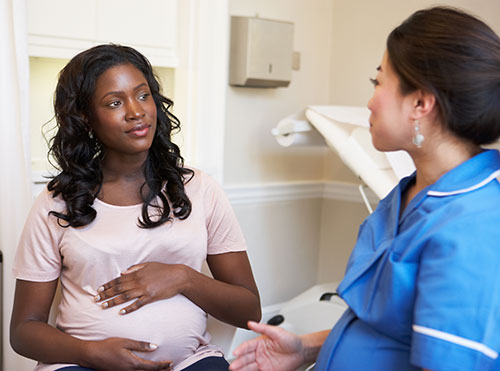Pregnancy and parenting require a great deal of strength—physically, psychologically, and emotionally. During pregnancy, the growing baby receives all of its nourishment from the parent’s body. While gaining weight is required for a healthy pregnancy, for those with eating disorders, having to gain weight can be very frightening.
Professionals recommend that disordered thoughts and behaviors are addressed before attempting to get pregnant. Eating healthy, well-balanced meals and maintaining a healthy weight for several months before conceiving and throughout pregnancy is important to protecting the health of yourself and your baby.
Complications of Disordered Eating During Pregnancy
Risks for the Pregnant Person: Poor nutrition, dehydration, cardiac irregularities, gestational diabetes, severe depression during pregnancy, premature birth, labor complications, difficulties nursing, and postpartum depression.
Risks for the Baby: Poor development, premature birth, low birth weight, respiratory distress, feeding difficulties, and other perinatal complications.
- Anorexia nervosa: Individuals can be underweight and may not gain enough weight during pregnancy. They risk having a baby with abnormally low birth weight and related health problems.
- Bulimia nervosa: Those who continue to purge may suffer dehydration, chemical imbalances or even cardiac irregularities. Pregnancy heightens these health risks.
- Binge eating disorder: Binge eating is often correlated with weight gain, which may lead to a greater risk of developing high blood pressure and gestational diabetes.
What If I Become Pregnant While Struggling with an Eating Disorder?
Though having an eating disorder may decrease the chances of pregnancy, sometimes those with eating disorders do become pregnant. When this happens, steps should be taken to protect you and your baby. Professionals can address the specific needs related to pregnancy and disordered eating only if you are willing to be completely honest with them about your struggles.
If you are pregnant and struggling with disordered eating:
- Be honest with your prenatal health provider regarding past or present struggles with an eating disorder or disordered eating. If they aren’t sensitive to your struggle and concerns, look for a provider who will be more considerate of your experiences.
- Extra appointments may be necessary to more closely track the growth and development of your baby.
- Consult a nutritionist with expertise in eating disorders before or immediately after becoming pregnant. Work with the nutritionist throughout the pregnancy to create a plan for healthy eating and weight gain. It’s often helpful to continue to see them postpartum.
- Individual counseling and support groups during and after pregnancy can help you cope with your concerns and fears regarding food, weight gain, body image, and the new role of parenting.
- Other classes on pregnancy, childbirth, child development, and parenting skills can also be helpful in preparation for this stage of your life.
- Allow your prenatal health provider to weigh you. This information is essential to tracking the health of your baby. If you would prefer not to monitor your weight gain, ask your doctor about standing on the scale backwards and instruct them to not share the number with you.
- Talk to your doctor before attending a prenatal exercise class to make sure it fits in with your recovery plan.
Tips for Healthy Body Image During and After Pregnancy
Be Aware of the Triggers of Pregnancy
The incessant counting, comparing, and measuring that happens during those nine months and beyond can tap into some of the very vulnerabilities that are linked to eating disorders and food and weight obsessions. Perfectionism, loss of control, feelings of isolation, and memories of childhood often bubble right to the surface. But if you’re getting the support you need, you’ll have a better chance of weathering those storms without resorting to self-destructive habits.
Resist the Urge to Shut Down or Close Off
Remember that there is nothing shameful about asking for help. It’s the most courageous thing you can do for yourself and your baby. Look at your recovery as an ongoing process that will help you reach your full potential as an individual and as a parent.
Break the Cycle of Body Hatred
Allow yourself to celebrate the fact that your body is working some serious magic right now. Before you get stymied by stretch marks or focused on loose skin, take time to reflect on how you will teach your child—in your words and in your actions—that you appreciate your body. We have the power to help future generations grow up placing a higher value on good health than on weight and physical appearance. But before we can pass along those positive attitudes, we must first embrace them for ourselves.
Source
Mysko, C., & Amadeï, M. (2009). Does this pregnancy make me look fat?: The Essential Guide to Loving Your Body Before and after baby. Health Communications, Inc.


